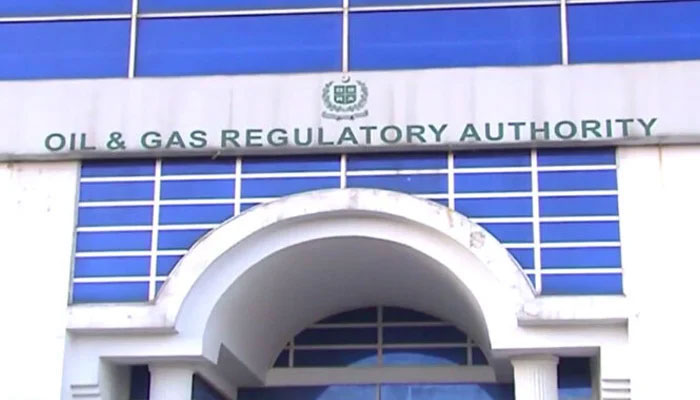OGRA raises RLNG prices up to 6.5pc for SSGC, SNGPL consumers
ISLAMABAD: The Oil and Gas Regulatory Authority (OGRA) has raised the prices of re-gasified liquefied natural gas (RLNG) for consumers of Sui Southern Gas Company (SSGC) and Sui Northern Gas Pipelines Limited (SNGPL) by over 6 percent effective May 1, 2024.
The price hike, announced on Friday, increased RLNG prices by $0.8559 per million British thermal units (mmBtu) or 6.5 percent for SSGC consumers and by $0.7978 per mmBtu or 6.16 percent for SNGPL consumers.
According to OGRA's notification, the new weighted average sale price for SNGPL consumers has been set at $13.744 per mmBtu, while SSGC consumers will be charged $14.0506 per mmBtu. In April 2024, the prices were $12.946 and $13.1947 per mmBtu for SNGPL and SSGC consumers, respectively. OGRA attributed the increase to higher supply charges.
Since September 2023, RLNG prices have fluctuated, with only two months recording price reductions. In September 2023, prices rose by 3.08 percent, followed by a 3.87 percent increase in October, a 1.2 percent increase in November, and a significant 10.1 percent increase in December.
Prices decreased by 7.8 percent in January 2024 and by 9 percent in February, before rising again by 2.57 percent in March and 1.06 percent in April.
The revised RLNG prices encompass various cost elements, including charges for LNG terminals, transmission losses, port charges, and margins for state-owned importers such as Pakistan State Oil (PSO) and Pakistan LNG Limited (PLL). These new prices are based on the 11 cargoes imported for the month, including 10 by PSO and one by PLL.
RLNG, being an imported product, is pegged to international oil prices. Consequently, an increase in international oil prices necessitates a corresponding price hike by OGRA. RLNG is a major contributor to the country's power generation. Therefore, an increase in RLNG prices elevates the cost of energy, subsequently raising the tariff for power consumers.
-
 World Economic Forum CEO Borge Brende Steps Down Following Jeffrey Epstein Ties Controversy
World Economic Forum CEO Borge Brende Steps Down Following Jeffrey Epstein Ties Controversy -
 Prince Harry's Ex Chelsy Davy Makes Special Announcement
Prince Harry's Ex Chelsy Davy Makes Special Announcement -
 Dominic Evans Speaks Out After Being Accused Of Being Involved In Nancy Guthrie Kidnapping
Dominic Evans Speaks Out After Being Accused Of Being Involved In Nancy Guthrie Kidnapping -
 AI Doomsday By 2028? New Study Warns Of Global Social, Economic Disruption & ‘ Intelligence Crisis’
AI Doomsday By 2028? New Study Warns Of Global Social, Economic Disruption & ‘ Intelligence Crisis’ -
 Do Sophie And Benedict Bridgerton Get Married As Netflix Show Returns For Season 4 Part 2?
Do Sophie And Benedict Bridgerton Get Married As Netflix Show Returns For Season 4 Part 2? -
 Prince William Reveals He's 'a Little Biased' Toward One Hollywood Star
Prince William Reveals He's 'a Little Biased' Toward One Hollywood Star -
 Meghan Markle, Prince Harry Visit Special Charity On Final Day Of Jordan Trip
Meghan Markle, Prince Harry Visit Special Charity On Final Day Of Jordan Trip -
 Natalie Dormer's Reaction To Sarah Ferguson's Epstein Links Resurfaces After 'The Lady' Release
Natalie Dormer's Reaction To Sarah Ferguson's Epstein Links Resurfaces After 'The Lady' Release -
 Did You Know Famous Windows 10 Background Was Shot In Real Life? Here's Story
Did You Know Famous Windows 10 Background Was Shot In Real Life? Here's Story -
 Pete Davidson's Baby Mommy Elsie Hewitt Reveals Why She 'hated' Being Pregnant
Pete Davidson's Baby Mommy Elsie Hewitt Reveals Why She 'hated' Being Pregnant -
 Harry, Meghan Show Royal Family How To Make Impact Without Public Money
Harry, Meghan Show Royal Family How To Make Impact Without Public Money -
 Hillary Clinton Set For Deposition Before House Committee Today In Jeffrey Epstein Investigation Case
Hillary Clinton Set For Deposition Before House Committee Today In Jeffrey Epstein Investigation Case -
 Samsung Galaxy S26 Ultra Debutes With Display That Blocks Side Viewers
Samsung Galaxy S26 Ultra Debutes With Display That Blocks Side Viewers -
 Fans In Shock As 'Smiling Friends' Creators End Cult-favourite Sitcom On Adult Swim: 'They Did It On Purpose'
Fans In Shock As 'Smiling Friends' Creators End Cult-favourite Sitcom On Adult Swim: 'They Did It On Purpose' -
 Meghan Markle Accused Of Mimicking Kate’s Iconic Style On 'pseudo Royal Tour'
Meghan Markle Accused Of Mimicking Kate’s Iconic Style On 'pseudo Royal Tour' -
 Social Media Addiction ‘like Smoking’: Mumsnet Calls For Under-16s Ban With Cigarette-style Warnings
Social Media Addiction ‘like Smoking’: Mumsnet Calls For Under-16s Ban With Cigarette-style Warnings




